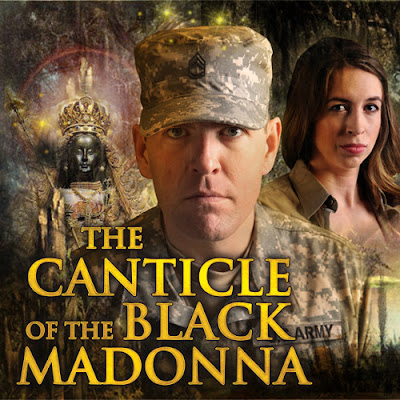This just appeared out of nowhere on Opera on Video. Actually, I guess everything there appears out of nowhere. Whatever.
It's about Adam, a soldier returning to his home in Louisiana and his wife Mara after an extended tour in Afghanistan (topical). But he is suffering from extreme PTSD from things he'd done and seen overseas. Mara and his friend John (a veteran of the first Gulf War who's been able to overcome his demons by this point) try to help him, but it is hard. Obviously. This is also the time of the horrific British Petroleum Oil Spill, so the damage caused there is implicitly compared to the damaged done to Adam. And on another narrative level, there also two angels and the titular Black Madonna, who sing some poetic hymns and also help the humans out. The ending is redemptive, as one would likely guess from the subtitle "A Soldier's Journey from the Desolation of War to the Healing Embrace of Love."
This is a seriously powerful piece of work. I mean, I like plenty of contemporary opera, but when something just sort of comes out of the blue at you, you tend to be slightly skeptical. At least I do. But no; it's really good, and the tonal music is powerful, a sort of contrast between the oratorio-like singing of the divine beings and the more "grounded" of the humans. Who the heck is Ethan Gans-Morse? He's just some young guy who doesn't even have a wikipedia page, but he done good here, as did the librettist, Tiziana DellaRovere. I do have to say, the whole "Black Madonna" thing seems a little arbitrary: you wonder how this particular spiritual vision relates to the human drama. There's nothing in the characters' lives or contexts that would suggest it. No biggie, though.
Part of this is definitely due to the casting. I was super-delighted to see Michael Mayes as Adam. I first (and last) saw Mayes as Joseph De Rocher, the title character in Dead Man Walking, where his performance was devastatingly effective. His character here is a different flavor of fucked up, but it's still an intense role, and he really brings it. Lindsey Cafferky as Mara also makes her character feel very real.
But everything is sort of overshadowed by Gwendolyn Brown as the Black Madonna herself. Holy shit, dude. The general lack of contraltos in operas is an odd thing: I get the argument that it's because not that many women develop that kind of voice, but composers have long written at least minor roles for them, suggesting that they thought appropriate singers could be found. But nowadays, those roles are almost always taken by mezzos. Contraltos could retaliate by taking mezzo roles, I suppose, but that never seems to happen. But I'll tell you that THIS is one role where you goddamn well need a real contralto, and they goddamn well got one. I don't think I've ever heard a woman with a lower singing voice than Brown. She's a force of nature, and it would be worth seeing the opera alone just to boggle at her.
But there are other reasons, too! Well done, everyone. I enjoyed and was moved by your work.






